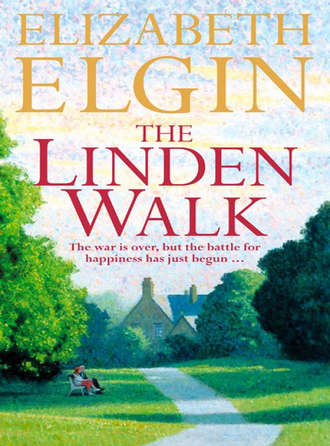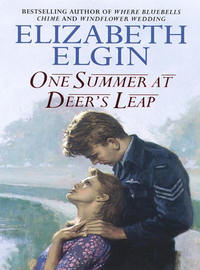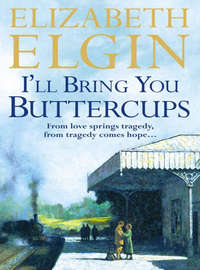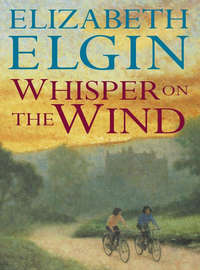
Полная версия
The Linden Walk
‘It’s all right, Mam. It swallowed up my Army gratuity and all of my savings, but I managed it.’
He was ashamed of the blatant lies that came too easily, but his mother had never been told about Daisy’s money. The fewer who knew, the better, Daisy had always insisted. Even Lyn thought the fortune her cabin mate had inherited on that twenty-first birthday was a mere thousand pounds, and only told because it had been necessary to find an explanation for Daisy’s visit to the solicitor at Winchester. What that inheritance had grown into over the years until Daisy came of age was obscene, almost. His fiancée had become richer than Drew, truth known. Amazing, really, how someone so flouncy and quick-tempered as Daisy could have kept all that money so secret.
‘Hullo, son,’ Polly Purvis smiled. ‘You’ve come back to earth, then? Where were you?’
‘As a matter of fact, I was thinking about West Welby.’ His cheeks flushed red again because he was not a good liar. ‘Was thinking, as a matter of fact, that you might be a bit disappointed when we go to see Beck Lane. Daisy and I found it a bit run-down and neglected. No one living in either Keeper’s or Willow End.’
‘It wouldn’t matter, Keth. I couldn’t go all that way and not walk down Beck Lane, now could I? And I’d want to take a look at Morgan and Beth.’
‘Of course you would.’ Keth took his mother’s face in his hands and gently kissed her forehead. ‘And maybe, if we are lucky, the bluebells will be out in the beechwood and if the piggy-bank runs to it, I’d like us to stay the night somewhere; make a real outing of it. And at least there are films for cameras in the shops again. We can take lots of snaps. But I want you to promise me you won’t get too upset, Mam.’
‘Just a little sad for my Dickon, allow me that. But I’ll count my blessings. I’ve always known that you take what life throws at you and that nothing lasts, neither good times, nor bad. And I shall look forward to going to Hampshire and staying overnight. Sure you can afford it, son?’
‘Sure – or I wouldn’t be asking you.’ He smiled, loving her very much, knowing he had lied again, that it was Daisy who insisted on paying for the trip. ‘We’ll have a look at the calendar – make sure it doesn’t clash with the wedding.’
‘Aah. The wedding.’ Polly smiled then closed her eyes and thought about the dress she had worn to Keth’s wedding and the fine hat Daisy had bought her in the swankiest shop in Harrogate. Polly Purvis had plenty of good times for the counting. Oh, my word, yes!
‘So tell me, Keth?’ Daisy slipped her arm into his, snuggling close, knowing she must tread carefully. ‘About France, I mean – if you haven’t changed your mind, that is?’
‘You’ve got to know, darling, then maybe when you do, you’ll understand why I’ve got to go back to Clissy.’
‘To France?’
‘Yes. To Clissy-sur-Mer when I became Gaston Martin and had a codename Hibou.’
‘So I was right all along,’ she whispered. ‘It was cloak-and-dagger stuff! You were in terrible danger, and I never knew.’
‘Not dangerous for me. I wasn’t the one who took risks, not real risks. I was taken there by submarine, rowed ashore then met and handed over to someone who told me her name was Natasha. I remember thinking at the time that it had come to something when a child was the best they could manage. I didn’t think that being out after curfew was a stupid – and dangerous – thing to do. She took me to Madame Piccard’s house. That house was all I saw of Clissy. Never went beyond the back gate; never saw the village.’
‘In what they called a safe house, were you?’
‘That’s it. I took the identity of a French soldier Gaston Martin, officially posted missing at Dunkirk; unofficially taken off the beaches with our lot and was then living in Ireland. He was deaf – caused by explosions. Lucky for me, that, as long as I remembered when a stranger came along, that I couldn’t hear a word they said.’
‘And did they? Come along, I mean.’
‘Once. One of the occupying German soldiers and the local gendarme with him. Routine check. Looking back, knowing what I know now, I think the gendarme was in on it – or at least sympathetic to anyone he suspected to be in the Resistance. I had supposedly gone to Clara Piccard’s house to dig her garden. I had a forged work permit with me and she made no bones about her hired help. Luckily, I knew how to dig.’
‘But Natasha – where did she come into it?’
‘Natasha – her real name Hannah Kominski – was adopted. Her parents were Russian refugees who lived in Paris, next door to Madame Piccard, who worked as a nurse there, before she retired to Clissysur-Mer. The Kominskis – they were Jewish – realized it was only a matter of time before they were arrested, so they made sure Hannah was safe. Madame Piccard had retired to Clissy by then. Her husband was killed in the Great War, so she’d gone back to nursing. They sent Hannah, with forged papers, to her for safe keeping. There were a lot of good forgers around in our war, Daisy. Hannah became Elise Josef and worked as a courier, sometimes, for the Resistance. She took the codename Natasha, because it was all she knew about her birth mother.’
‘And the Kominskis?’ Daisy whispered, all at once sad.
‘There were a few letters from Paris, then nothing. Tante Clara – that was what Natasha called her – said they must have been deported and we all know now that meant to a concentration camp.’
‘But how did Hannah survive? Why wasn’t she picked up, too?’
‘Because she was dark, but not Jewish; didn’t have the Jewish nose. Do you know, darling, that the Nazis had an instrument for measuring noses? Natasha’s real mother had given her a tip-tilted nose. It saved her life, I suppose.’
‘So can you tell me why you went to France? Did you even once consider the risk you were taking?’
‘I did. It was the only way for me to get back home from Washington. I was stuck there and I nagged them until they said okay, that I could go back to the UK as soon as a passage could be found for me. But there were conditions attached, they said.’
‘Conditions like you owed them one, sort of?’
‘That’s it. Because I was a mathematician, I worked in the cipher department at the British Embassy in Washington. They knew I had knowledge about – well – a certain machine. Very secret, really.’
‘Mm. Talk had it where Lyn and I worked in the war, there was a secret machine there, too. So secret, in fact, they had an armed Marine sentry always outside the door. I didn’t see it. Wasn’t even allowed near the door …’
‘Sounds as if it could have been like the one I’d been sent to collect. They called it Enigma, and because I’d worked on a similar one in Washington, they thought I was the best bloke to collect the special one from France. Special, because our lot could only break German Army messages and their Luftwaffe messages. We needed to be able to break their naval code. It was urgent. We were losing too many merchant ships in the Atlantic’
‘I know, Keth. I spent my war in Liverpool, don’t forget, and I know that the underground bunker I worked in looked after ships in the Western Approaches and the Atlantic. Looked after! Half of every convoy was sunk!’
‘So you’ll realize the importance of the naval Enigma I was sent to collect. And don’t ask me how it was come by. All I know is that when I got it back, I was told they’d only recently acquired another. I hit the roof. Asked the fellow there if he wanted a matching pair for his mantelpiece, or something, and did he know that a kid of sixteen had been shot, getting me and his precious bloody machine onto a Lysander to fly it back to England?
‘But he only said that things like that happened when there was a war on and that sailors had been killed, too, getting the other one. A right swine, he was. Hard as nails. I thought I’d blotted my copybook good and proper and that he’d send me back to Washington, out of spite. But he didn’t. I was debriefed, warned to keep my mouth shut, or else’ – he pulled a finger across his throat – ‘then sent back to Bletchley Park.’
‘So you were in England for a time and I never knew it, Keth?’
‘That’s right. I couldn’t even phone you. I was told to write letters as if I were still in Washington and they doctored them to look as if they’d been posted there. That’s why I shouldn’t be telling you this. It’s why our little girl is called Mary Natasha and why you must never speak of it to anyone but me.’
‘And it’s why you need to go back to Clissy-sur-Mer?’
‘Yes. To try to find Natasha’s grave – if they gave her a decent burial, that is. And I need to know – or at least my conscience needs to know – what happened to Tante Clara and Denys and Bernadette, too. Bernadette was a wireless operator for the Resistance. I never knew what Denys did, only that he and Natasha took me to a field at the back of the chateau and put down landing lights for the Lysander pilot to see. Two minutes was all that pilot was allowed to land, get me on board, then take off. I try not to think of it …’
‘But you do, Keth, all the time, and it’s why you must go back to France just as soon as restrictions are lifted. You and I have so much, darling, and I want you to go, if only to say a thank you, and a thank you for me, too, to those people who hid you and got you safely back. I owe Natasha, as well. I wish there were some way of letting her know. And I won’t say a word. You know I can keep secrets.’
‘Like your money? I know you won’t talk about it, ever, though one other person knows. Y’see, when it was all over and done with and before I went back to Bletchley Park, I was given leave.’
‘Yes. I got leave, too. We wangled a night together. But who did you tell, Keth? You were taking a risk, weren’t you?’
‘Not really. It was Nathan Sutton I told. I felt so bad about it and that I was safe back in England when a whole lot of people at Clissy were almost certainly arrested and interrogated. Maybe even shot. I couldn’t square it with my conscience until I’d told someone. Nathan was a priest. We went for a walk to the top of the Pike and he got the lot. I felt better for telling him and I knew he would treat it like a confession – sacrosanct. Knowing Nathan, he wouldn’t even tell your Aunt Julia.’
‘No. Not him. But can we talk about it again, when it won’t be quite so bad for either of us? There’s so much I want to know, but my mind’s in a spin. It’s a shock, knowing we might never have married, or had Mary; that you might never have got back.’
‘Sobering thought, isn’t it? And worse than that, even, was Natasha getting the bullet that was meant for me. A bit of a lass, and far braver than I was.’
‘So that’s why you’ll go back, darling. And I want you to. Just you and your conscience and your thoughts. It’ll help. I know it will.’ She lifted his hand, kissing his palm then closing his fingers around the kiss. ‘And do you know how much I love you, Keth Purvis?’
‘As much as I love you, Daisy love. And thanks for understanding, and that it’s best I go alone – maybe after the wedding, in the Whit school holidays.’
‘Whenever, darling. But right now, will you kiss me, then hold me tightly and tell me you love me and that you’ll never do anything so stupid again.’
‘I won’t. I promise.’ He kissed her gently, then again, passionately, and she kissed him back. ‘Have we got time, darling? Before Mary wakes for her ten o’clock feed?’ she said softly, lips against his ear. Then she kissed his eyes, the tip of his nose, his mouth. ‘Have we?’ she whispered huskily.
EIGHT
‘That wouldn’t be coffee?’ Ewart Pryce raised an eyebrow to the percolator that slurped lazily on the stove.
‘It would. Real grounds. Got a quarter of a pound, yesterday. Things are looking up. Time for a cup?’ Anna lifted her cheek for her husband’s kiss.
‘Please. Not many in the surgery this morning, and only three visits. So what’s news?’
‘Not so good. Two bad bits in the paper. National Service increased from a year to eighteen months and the King and Queen aren’t going to Australia. Seems the King isn’t very well. Any idea what the matter is?’
‘Haven’t a clue, darling. Buckingham Palace haven’t consulted me.’ His eyes lit on the envelope and the large, old-fashioned writing in black ink. Always black ink. ‘Your mother …?’
‘Mama has decided to come to the wedding, but must decline my offer of a bed. She will be staying at Denniston House, she says, and has written to tell Tatiana. Ewart, why can’t she stay with us? Tatty is going to be busy enough without two house guests – even if they are family. Igor won’t be any trouble, but Mama will complain. She always does.’
‘She’s an old lady, darling, and she misses Russia.’
‘So do I. So does Igor, but we don’t go on and on about it. To me, Russia is a long way away and a long time away. My daughter is as English as they come, and as for myself – well, I’m happy being the wife of a country doctor, even if Mama thinks I’ve lowered myself into the middle classes.’
‘The old get bewildered, Anna. She lost her husband and a son in the uprising.’
‘Yes, thirty years ago, but she’s still in mourning. She likes being unhappy, but I’m glad she’ll be there to see her granddaughter married. Karl will look after them when Bill and Tatty leave for their honeymoon, and I’ll keep an eye on things – tactfully, of course. And I’ve got to fly, or I’ll miss the bus. Going to Creesby for a final fitting and to pick up my wedding hat.’
‘You’re looking forward to it, aren’t you, darling?’
‘I am. And if Tatty’s half as happy as I am with my middle-class marriage, she can consider herself lucky. Heavens! Is that the time! See you, Doctor dear!’
With a banging of doors she was gone, and Ewart smiled fondly, whispering, ‘And I love you too, Anastasia Aleksandrina Pryce,’ then poured himself another cup of coffee.
‘Letter from Lyn?’ Julia asked. ‘Everything all right at her end?’
‘Complications, actually,’ Drew frowned. ‘Her folks are arriving on the fifteenth of December.’
‘So what’s complicated about that?’
‘Nothing at all. She’s looking forward to seeing her mother – and her father. Be interesting, that, since she hasn’t seen him since she was a schoolgirl. Trouble is though, what with one thing and another I won’t be seeing Lyn till Tatty’s wedding. Seems she’s swapping her shifts around so she can get time off for that. Not a lot of good, this long-distance courting.’
‘So why must it always be Lyn who comes here? Hasn’t it ever occurred to you to shift yourself and go to her place? And if it’s going to use up too many petrol coupons, get yourself on the train, for heaven’s sake, like Lyn does.’
‘I’d thought about that a couple of times but decided against it. After all, Lyn lives in a little village. There’d be sure to be talk.’
‘Andrew Sutton, I don’t believe it! Girls don’t need chaperoning, now! And why are you suddenly so holier-than-thou? I’m sure Lyn wouldn’t mind losing her reputation – even if nothing happened.’
‘Now it’s my turn not to believe it! Are you suggesting a dirty weekend or something, and you a priest’s wife!’
‘Drew! I’m beginning to lose patience with you. Dirty weekend, indeed! You make it sound sordid, and it shouldn’t be. Not between you and Lyn. And did I suggest you sleep together? I merely said that you should go and see her once in a while. Why should Lyn do all the running about?’
‘I think she comes here because that’s the way she wants it.’
‘You’re sure? Has she said so?’
‘N-no. Not in so many words, but wouldn’t she ask me if she wanted me there?’
‘She’s your fiancée, Drew. Does she have to ask you?’
‘I suppose not, but – oh, hell, Mother, I don’t know. Sometimes, I just don’t know!’
He got to his feet, walking to the window, hands in pockets and Julia knew, from the set stiffness of his shoulders, that now was the time to ask.
‘Don’t know what? That everything isn’t as it should be, that you made a mistake? Is that what you’re trying to say, Drew?’
‘Of course I haven’t made a mistake. I want to marry Lyn. But does she think the same way? And I ask that because I know something isn’t quite right. She’s gone on the defensive, kind of. It’s as if she’s all at once shy with me. It was better between us when I used to take her out, in Liverpool. When Daisy was on leave, I mean, and the two of us got on just fine.
‘Lyn was fun, then. She laughed a lot and we did mad things; ate fish and chips out of newspaper and went to Charlie’s, on the Pierhead, for a mug of tea and a cheese sandwich. Wads, we called them.’
‘Yes, Drew, but that was before Kitty. If what I heard is to be believed, Lyn was in love with you even then; had hopes that someday, things between you might develop, sort of.’
‘I’ve asked her to marry me. Surely that’s development enough? But I don’t think she’s as sure of her feelings, now. Oh, outwardly things are fine between us, but there’s a wariness in her eyes. I can see it.’
‘Look, Drew – I’ve got letters to post. Walk with me, to the village?’
Out of the house, Julia thought, it might be better. Outside, neither of them would be able to show anger, annoyance.
‘Okay. Could do with a breath of fresh air.’
‘Then shall we go through Brattocks and down the lane, the long way round? Might be as well, if we did. Get things into the open, sort of. And I know you need to talk to me – talk to someone, Drew – though heaven only knows why it can’t be to Lyn. You were always easy in her company. What’s gone wrong?’
‘I wish I knew.’
‘Mind if I make a suggestion? Could it be that suddenly Lyn is worried that she can’t follow Kitty? Have you and Lyn been lovers?’
‘No, we haven’t.’ He closed the door behind them with an unnecessary bang. ‘Once, we might have been but not now, it seems.’
Not since the night, outside Wrens’ quarters, that Lyn had told him she loved him, wanted him. Offered it, actually, though nothing happened because he hadn’t been quite sure. Of himself, that was. It was as if he’d known, even then, that he was waiting for Kitty. But he couldn’t say that. Not to his mother. Not to anyone. There were things you just didn’t talk about, and that was one of them.
‘Once? Before that night you met up with Kitty? You were very sure, about her.’
‘Very sure. She knocked me for six. I’d loved her all my life, and I hadn’t known it. We spent the night together and it was so easy, so right. Are you shocked?’
‘Shocked? And what makes you think that only you and Kitty knew about love? I loved like that, once. When Andrew and I were apart, all I could think of was soft, sinful double beds. And I would have, even before we were married, but Andrew counted to ten for both of us! I know what it’s like to love desperately in wartime, so don’t think I’m uptight about you and Kitty. I was young, too, don’t forget.’
‘Then you married Nathan, Mother?’
‘Yes. I married him because I loved him. Differently, I’ll grant you, and the only mistake I made was not doing it sooner. I can talk about Andrew now with affection, and Nathan accepts that. Does Kitty have to come between you and Lyn, Drew, because it seems she is!’
‘Not as far as I’m concerned, she isn’t. But there was a war on when Kitty and I were together. No tomorrows, remember …’
‘I remember. God Himself knows I remember, but if you can’t convince Lyn that it’s her you are marrying, then things aren’t going to get any better. You’ve got to be sure – both of you.’
‘I’m sure, Mother, but I know Lyn isn’t. Not entirely. She wanted the wedding changed from June to April. I don’t think she wants to carry white orchids, either. She said that June seemed to her to be a remembering month; that it was in June Kitty and I should have been married and another June when Kitty was killed. And it’s every June that Jack Catchpole puts a bouquet on her grave. Can you blame Lyn for getting the jitters?’
‘No, I can’t,’ Julia said softly. ‘But I blame you, Drew, for letting her have doubts. Don’t you think it’s about time you sorted things between you?’
‘So what do you suggest I do?’
‘Do? You get yourself over to Wales this next weekend, show willing for once. Lyn can’t come to you, so you must go to her! And I don’t mean you should both leap into bed. Far from it. It seems Lyn is unsure enough, without you making it worse. Just be with her, Drew. Talk to her, because she sure as anything wants to talk to you! Be nice to her and if you’ve got to, eat fish and chips out of newspaper!’
‘You’re right. You usually are, dearest. But in what way do you think Lyn is unsure? Might help a bit, if I knew.’
‘I’d bet anything you like that she’s unsure about herself; unsure because she’s a virgin, still, and she’s afraid you’ll compare her to Kitty.’
‘Oh, no. I can’t accept that! Lyn was always very blasé; completely sure of herself.’
‘Well, for what my opinion is worth, she isn’t so sure about things now. Lyn is a woman in love and she’s afraid of losing you. I think she fell in love with you the first time you met and nothing has changed, I’m pretty sure of it.’
She dropped the letters in the pillar box, then turned for home.
‘My, but it’s cold. One good thing about late November is that there are very few people about. No one stops you for a chat! Let’s go to the kitchen, and sweetheart a pot of tea out of Tilda?’
And Drew smiled and said, ‘Y’know, for someone who isn’t a mother, you’ve made a pretty good job of being mine. And I’ll go to Llangollen this weekend – surprise her.’
‘Yes, and get something sorted out, eh? Clear the air, why don’t you?’
‘Clear the air,’ Drew nodded, though how, exactly, he wasn’t sure. Play things by ear, should he? Alone together in that little house, things just might be different. He would have to go carefully, for all that, because he didn’t want to lose Lyn; would never forgive himself if he said the wrong thing and got his ring thrown back at him for his pains.
Dear Lyn, who had always loved him.
Drew stowed away his bag, then laid the flowers carefully on top of it, thankful he was on the last leg of his journey. Change at Manchester, change at Chester for Wrexham; bus from there to Lyn’s place. And she had done it every weekend she could get away, bless the girl.
But he was bearing gifts. Tom had given him a young pheasant, plucked and ready for roasting. Alice had sent a new-baked loaf and Tilda had scraped enough rations together to make a baking of cherry scones and wrapped four in greaseproof paper, with her love. And Willis had sent chrysanthemum blooms because he feared frost, soon, and those he couldn’t dig up and plant again in the shelter of the greenhouse, he had cut for folk deserving of them.
‘There’s ten tawnies for your intended, Sir Andrew. Match that hair of hers,’ Sidney Willis had chuckled. ‘Sent with compliments. And mind you don’t knock their heads off between here and there. Very top-heavy those big blooms are.’
Tawny, to match her hair. Lyn was very beautiful; had the green eyes and porcelain skin of a true redhead. And in summer her face freckled – on her cheekbones and across her nose.
He had thought often, lately, about her body and how it would be. Her naked body, that was. He had never seen her anything but well covered. At first in thick black stockings and shirt and collar and tie; latterly in civilian clothes, true, but only in his imaginings had he seen her naked, in bed, in his arms.
The conductor of the green bus interrupted his thoughts, asking where to, and a return or a single, was it? And Drew handed him the correct money and was told that in five minutes he would be at Croesy-Dwfr, which he knew to be the crossroads near the hamlet in which Lyn lived. Only a few more minutes and she would open the door and say, ‘Hullo, sailor!’ like she used to and he would wonder how he could ever have thought things weren’t right between them.









